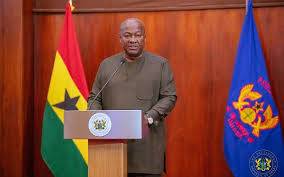Ghana's Economic Shock Therapy: A Bold Move to Reduce Debt and Revive Growth
In recent months, Ghana has found itself at a critical economic crossroads. With rising inflation, mounting external debt, and sluggish economic growth, the government has been forced to take decisive action. Finance Minister Cassiel Ato Forson recently announced a series of aggressive reforms—what he calls "shock therapy"—to stabilize the economy and restore investor confidence. But what does this mean for the average Ghanaian, and how will these changes impact the nation’s economic landscape?
Understanding Ghana’s Economic Challenges
Ghana, once hailed as one of Africa’s fastest-growing economies, has been grappling with severe financial difficulties over the past few years. The country’s public debt surged past 80% of GDP, making external debt repayments a significant burden on the national budget. This debt crisis was further exacerbated by global economic downturns, fluctuating commodity prices, and the effects of the COVID-19 pandemic.
Inflation in Ghana soared to over 40% in 2023, drastically reducing the purchasing power of citizens and increasing the cost of living. The depreciation of the Ghanaian cedi also placed further pressure on businesses and households, making imports more expensive and raising operational costs across various sectors.
What is Economic Shock Therapy?
Economic "shock therapy" refers to a set of radical economic policies designed to rapidly address financial instability. Typically, these measures include deep cuts in government spending, tax reforms, privatization of state enterprises, and structural adjustments to restore fiscal discipline.
For Ghana, this means:
Reducing Government Spending: The administration is cutting non-essential expenditures and restructuring public sector wages to reduce fiscal pressure.
Tax Reforms: The government aims to remove poorly designed taxes while broadening the tax base to ensure more effective revenue collection.
Debt Restructuring: By negotiating better terms with international creditors and implementing a strict debt repayment plan, Ghana hopes to regain financial stability.
Encouraging Private Sector Growth: Creating a more business-friendly environment to attract foreign direct investment and stimulate local industries.
Impact on Ghanaians: The Pros and Cons
The Good News:
Lower Inflation: With better fiscal discipline and controlled government spending, inflation is expected to decline, leading to improved purchasing power.
Stronger Cedi: A more stable economy could help stabilize the Ghanaian cedi, making imports cheaper and reducing financial uncertainty.
Job Creation: Increased foreign investment and support for local industries could generate employment opportunities for citizens.
Economic Resilience: In the long run, these reforms will make Ghana’s economy more resilient to global shocks and external financial pressures.
The Challenges:
Short-Term Hardship: Reducing government spending could mean fewer public sector jobs and reduced subsidies, affecting many households.
Higher Taxes for Some: While some taxes will be removed, others may be introduced to widen the tax base, potentially impacting middle-income earners and businesses.
Initial Market Uncertainty: The transition period may lead to short-term fluctuations in business confidence and investor sentiment.
How Can Citizens Adapt?
Given the economic adjustments, Ghanaians need to take proactive steps to navigate these changes effectively:
Budget Wisely: Households should prioritize essential expenses and cut down on non-essential spending.
Invest in Skills Development: With shifts in the job market, upskilling and reskilling will be crucial for employment security.
Support Local Businesses: Buying locally produced goods can help sustain small businesses and strengthen the local economy.
Stay Informed: Understanding government policies and economic trends will help individuals and businesses make better financial decisions.
Conclusion: A Necessary Reset?
Ghana’s economic "shock therapy" is a bold and necessary step to address the country’s growing debt crisis. While the short-term impact may be challenging, these reforms are designed to create a more stable and prosperous economy in the long run. As the government implements these measures, the focus should remain on ensuring that the most vulnerable citizens are protected, and that growth is inclusive for all Ghanaians.
The road to economic recovery is never easy, but with resilience, strategic policies, and public cooperation, Ghana has the potential to regain its economic strength and emerge stronger than ever.




No comments yet
Be the first to share your thoughts!